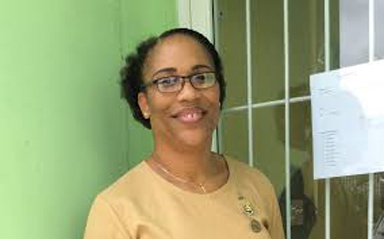By Orville Williams
As the back-and-forth between the Health Ministry and the nursing fraternity continues, the Antigua and Barbuda Nurses Association (ABNA) has thrust a major spoke in the wheel – disclosing that several nurses are gearing up to leave the island for more desirable professional opportunities.
President of the ABNA, Soria Dupie-Winston, made that disclosure yesterday, while speaking on the nursing shortage that several Caribbean countries – including Antigua and Barbuda – have been facing and continue to face during the Covid-19 pandemic.
Despite acknowledging the widespread nature of that challenge, she insisted that the authorities here in Antigua are not doing enough to support the nurses.
“We’re not saying that all over [they’re] not facing a nursing shortage, but why can’t we be different here, to have incentives to retain our nurses?
“I have news for the Minister of Health, there are several nurses who will be leaving Mount St John’s sometime later this month or next year. They’ve already travelled and done their exams and their paperwork, so they’ll be leaving again [and] the country will be left even more devoid of nurses.
“We can look at other countries and say, ‘oh, they have the same problem’, but what are we doing to correct the problem?” Dupie-Winston asked.
The nurses have long been complaining about the insufficient wages that they’re paid and the lack of adequate incentives to supplement said wages, with those age-old issues taking centre stage over the course of the ongoing pandemic.
Given the new, dangerous conditions the nurses were being required to work in, an agreement was reached in April last year for the payment of a ‘risk allowance’ – valued between EC$1000 and EC$1500 – to those on the frontline, including those involved in Covid testing.
There have been hiccups with the government living up to that agreement and similar hiccups re-emerged over the past week, with nurses threatening to withhold their services due to the non-payment of certain funds and also due to the removal of some nursing personnel who were stationed at VC Bird International Airport.
On Tuesday, Health Minister, Sir Molwyn Joseph, led a press conference – alongside Permanent Secretary in the Health Ministry, Ena Dalso-Henry – in a bid to clarify the situation.
He explained that the core salary payments for the nurses were made, but the risk allowance for some was being held up because of administrative issues. He also said the reports of nurses being severed were inaccurate, insisting that the personnel were only redeployed elsewhere in the health sector, as the demand for them working at the airport had waned.
Those clarifications were rejected by Nurse Dupie-Winston during an appearance on Observer AM. She pointed to a handful of nurses who “have never been paid the EC$1000 stipend” and specified that, while some nurses have indeed been paid their regular salary, their risk allowance and other similar allowances, they have yet to receive overtime payments that were also promised.
“The document that I have that [the nurses] received from the permanent secretary, stated that they would be paid EC$25 an hour for their overtime. Now, their regular working hours are 8am to 4pm, [so] when they work from 4pm to 10pm, they are to be paid $25 an hour.
“I have [another handful of nurses] who have all stated they have not been paid [the overtime] for January up to now,” she explained.
Dupie-Winston said the nurses are also aggrieved at the decision to redeploy those previously stationed at the airport, saying that decision was made unceremoniously. She insisted that the nurses are required at the airport – as the country’s main port of entry – not just for Covid management, but to also deal with other public health-related issues.
Speaking on the matter further, she rebuffed the Health Minister’s claim that no nurses were severed, referring to one public health nurse in particular who ‘came out of retirement’ to assist, but was apparently told that her services were no longer required.
Dupie-Winston questioned that decision, given that nurse’s qualifications and experience and the sustained threat posed by the pandemic.
“I called around to my counterparts in several Caribbean countries…port health is manned by public health nurses, public health inspectors and registered nurses.
“Presently at the airport, there are civilian personnel from different ministries, EMS workers [and] nurses. Why is it in Antigua that our port of entry, which should be one of our strongest defences, is lacking?”
Given the frequency of these and other issues, the president warned that there will come a breaking point for the nurses.
One would hope that these issues could be resolved sooner rather than later, since the sustained threat of the pandemic means that nurses and other healthcare professionals are needed now, more than ever.

